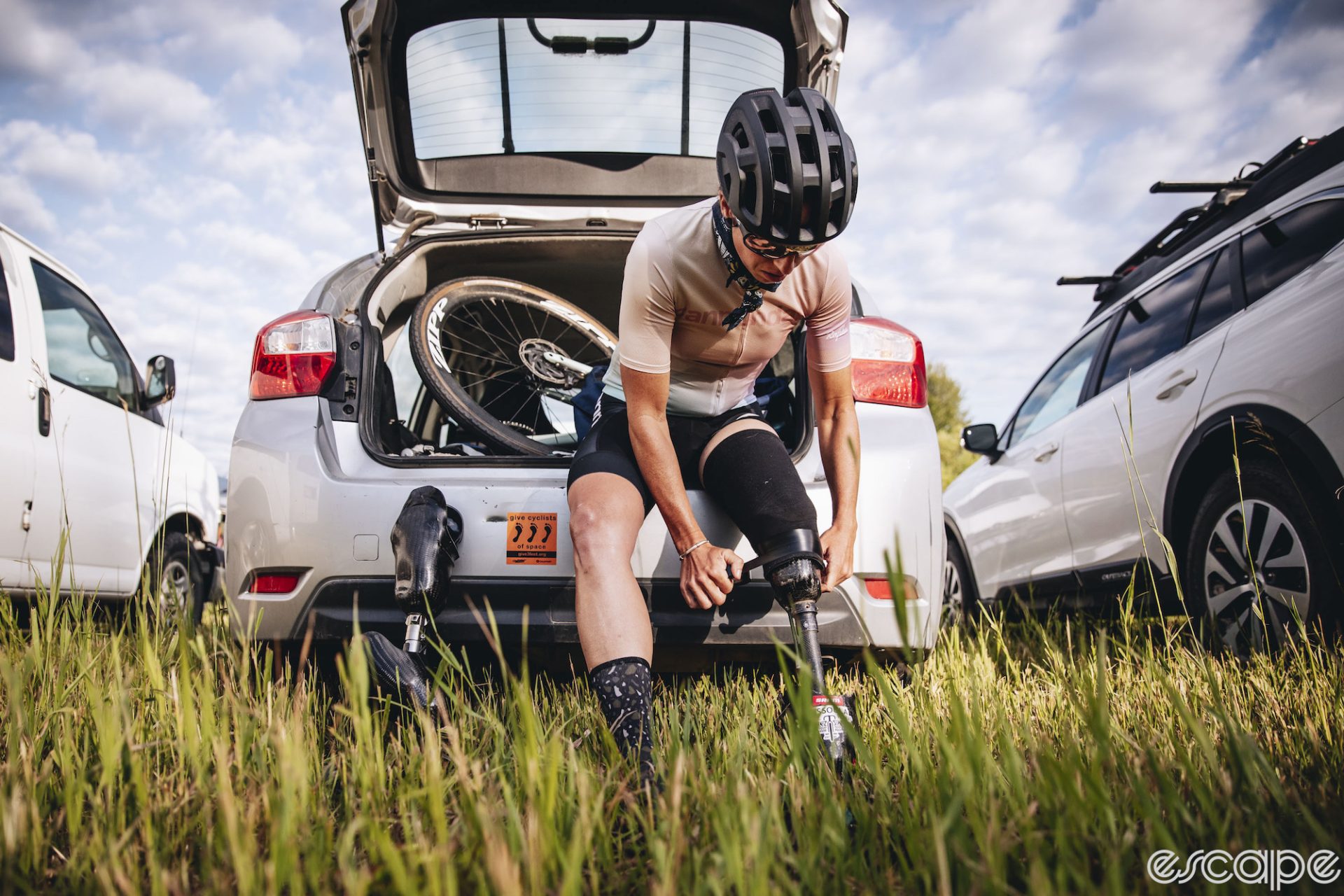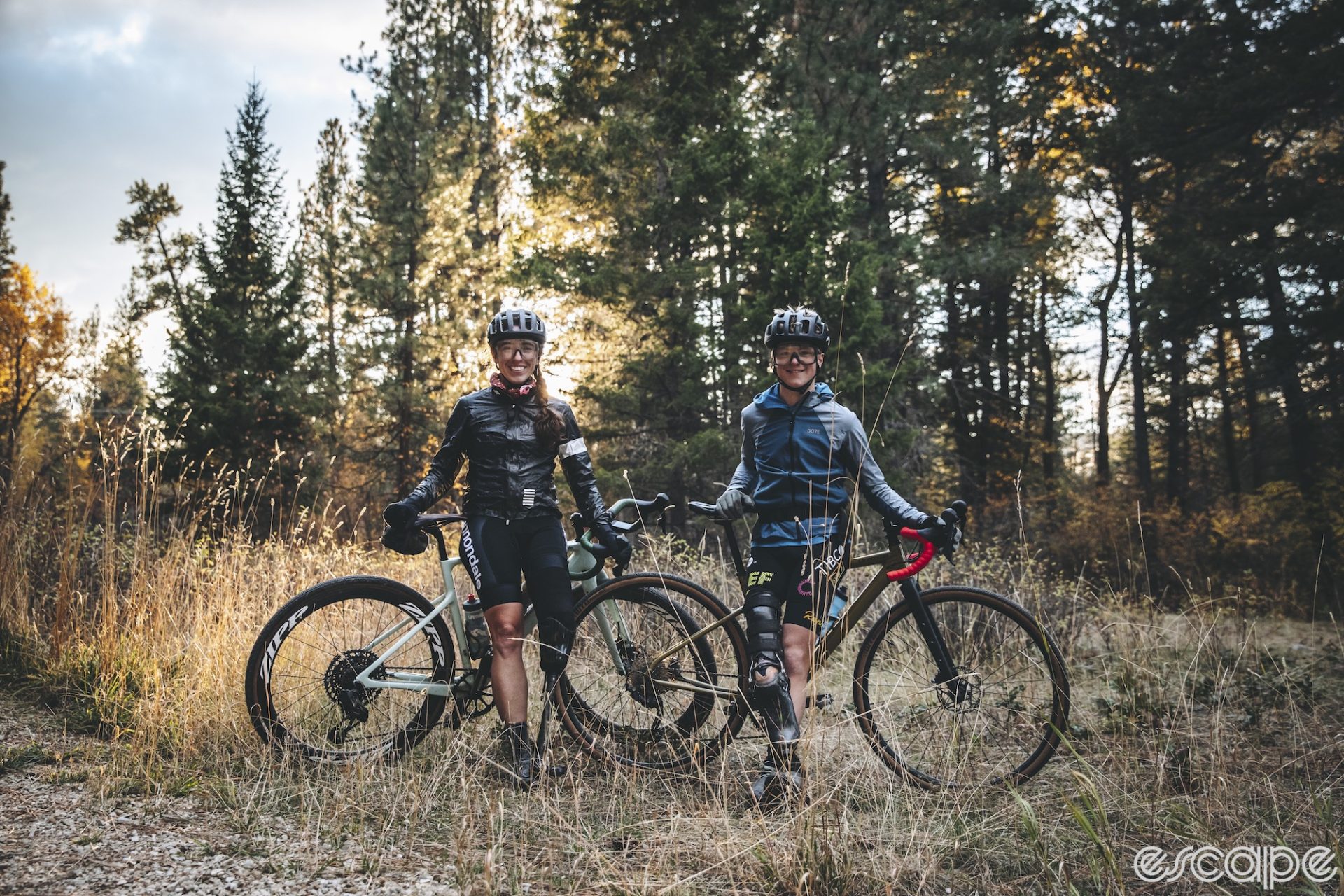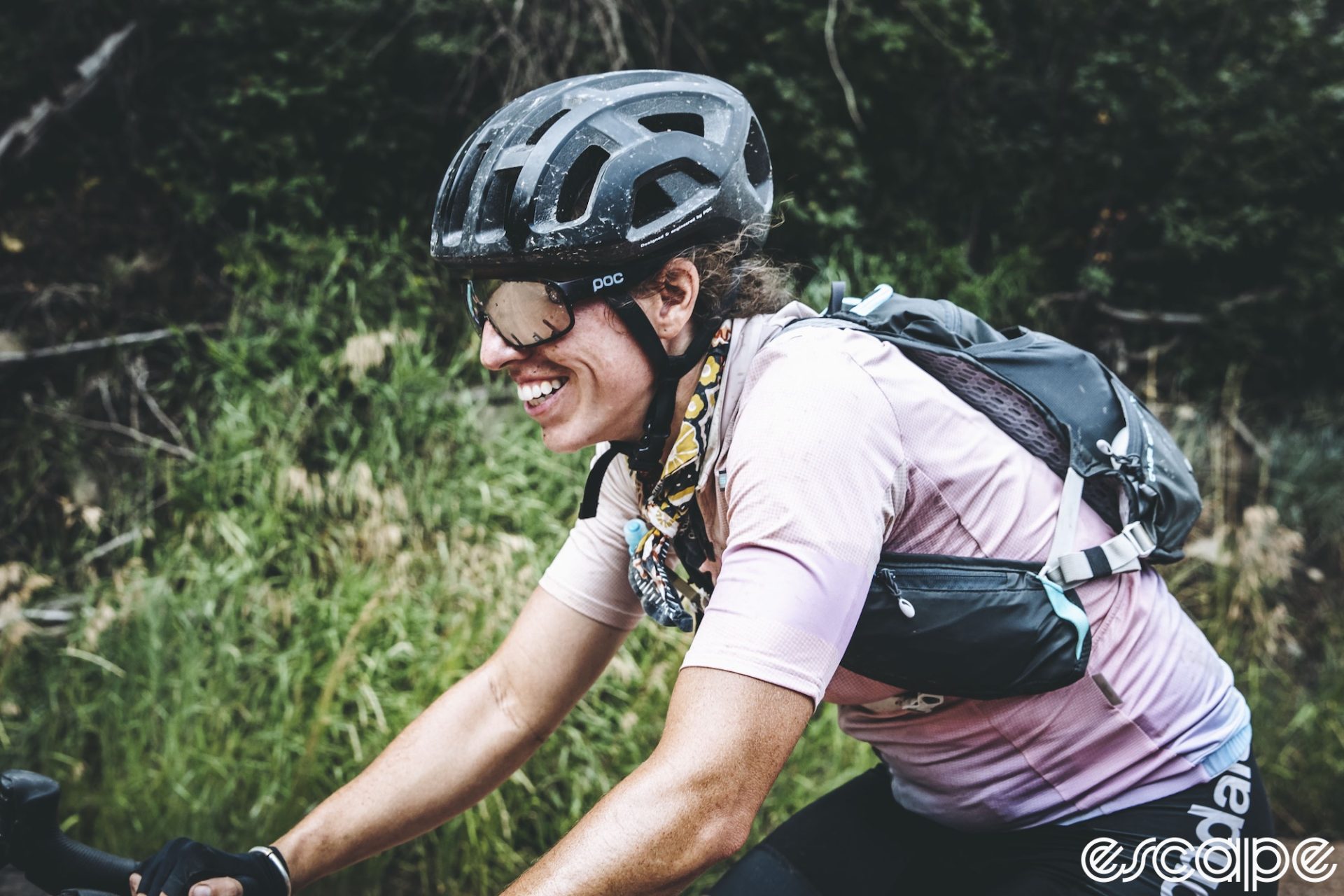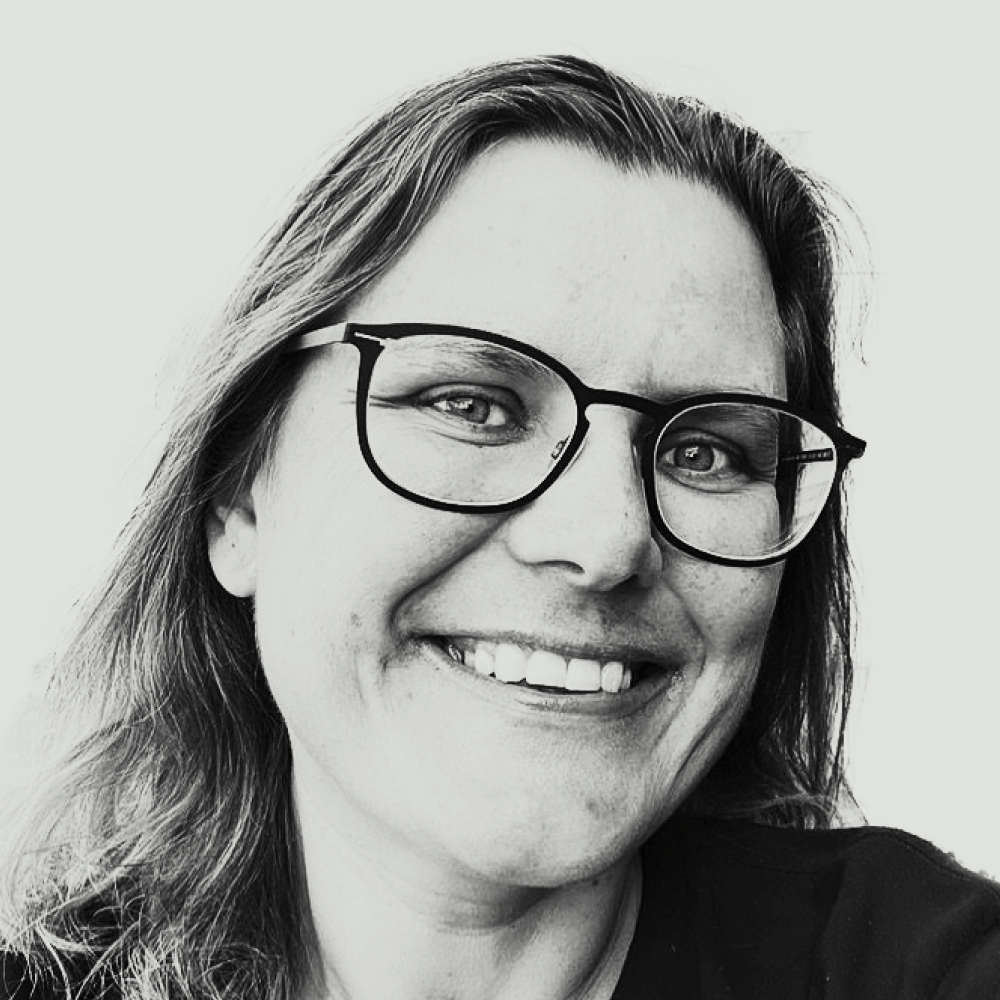Last year Meg Fisher was the only female para-athlete among more than 3,200 finishers in Unbound Gravel. At this weekend’s edition, more than 4,000 riders are signed up in events of various distances, and Fisher – who is taking on Unbound 200 for the fourth time – will be joined by three other women with a permanent physical impairment. That’s thanks to Fisher, who helped create a category for para-athletes and aims to grow the community and show that cycling and especially gravel is an inclusive sport for everyone.
In 2002, Fisher was a competitive tennis player in college when she and her partner Sara were involved in a rollover car crash. Sara lost her life. Fisher lost the lower part of her left leg, half of her abdominal muscles and took a life-threatening blow to the head that left her comatose and on a ventilator for a week.
During a long recovery, she turned to cycling and won multiple world titles in paracycling and para-triathlon. At the 2012 London Paralympics she won a gold medal in the time trial and a silver on the track in individual pursuit. She retired from competition after the 2016 Paralympics in Rio de Janeiro with another silver and bronze medal. She also finished a doctorate in physical therapy, is a certified athletic trainer and USA Cycling Level 3 coach, and now rides gravel races across the country, a far different experience than the controlled environments of the velodrome.
“The first two [Unbounds] I did were very hot,” Fisher says from her home in Missoula, Montana. “The third one was very muddy but the temperatures were comfortable. This weekend they predict heat again, between 80-90° Fahrenheit (26-32° C) which adds to the hardness of this ride.
“Riders have heat stress or even heat stroke and try to find whatever shade they can. We are on the Kansas prairie and there is hardly any shade. I even watched a rider take shade in the elongated shadow of a telephone pole in one of the previous editions. You don’t want to take shelter in ditches because of ticks and bugs but you want to find whatever shelter you can from the relentless sunshine. The locals coming out with coolers of water are literally lifesavers on these days.”
But last year’s wet conditions – rain turns the Flint Hills’ dirt into thick, sticky mud – came with a whole new set of challenges for Fisher, who competes with a foot prosthetic. “In the mud everyone was complaining because their feet were caked in mud and their bikes wouldn’t roll,” she says. It was even harder for Fisher. “My foot has such a hard time in the mud because I just poke holes. Because I basically have a pirate leg and hardly any movement in the knee, I can’t walk on uneven surfaces. I need to keep riding and use my bike as support. Luckily, I ride that Lefty fork from Cannondale so my front wheel kept spinning.”
Despite the weather, Fisher finished the 2022 edition of Unbound like she did the previous two, and even notched her best finish time. She shares the stories with a smile and an overwhelming sense of gratitude for the races she gets to ride and the places she gets to see. She is most grateful for the sense of community gravel brings her.
“When I kept on fighting in the mud, I felt that if others could see me moving, I could give them a positive nudge. That if I can do it, they can do it and it will all be alright. I don’t want to be all self-important and [I] know that cycling is not the solution for world hunger and it won’t bring world peace but it brings a sense of community.
“Generally, I am pretty happy until 50 miles to the end and then think: yes, I am ready for this to be over. In road racing I raced at the pointy end of the race but I am now in the back. The people around me are also in the back. There is no longer that competitiveness. We are not there to hurt each other. We tell each other stories, help with mechanicals, share calories and just share the camaraderie.”
Fisher’s eyes light up as she shares these stories. She never got bitter after the hardship life threw at her. She picked herself up again and shares that natural positive view on life with everyone around her in a very natural way.
“I always say ‘good job’ to the riders passing me or when I pass them, I wave and I give them a nod. That hopefully cheers them on but it also cheers me on. It lifts my spirit to do this together.”
Racing 200 miles in unforgiving heat and terrain – Unbound 200 has over 9,000 feet of climbing this year – is not something you endeavor without preparation. It’s not only about preparing the bike, training, and getting a support team. It’s also about the mindset, and Fisher aims to inspire by showing she is just like anyone else in a 200-mile ride: with highs and lows but also with challenges specific to her situation.
“The challenges you chose prepare you for the challenges that you don’t choose,” says Fisher. “I need around 19 hours to do this while the top competitors like Peter Stetina need around nine. That’s a whole different world. In my race I compartmentalize and have very small and very basic goals. There are very basic decisions to take like where I rest, what I eat. After that I need to keep my legs moving and keep going forward.”
These long races are a war of attrition that need proper fueling. Unbound is a race where you take care of yourself with the exception of two aid stations along the route which provide only water (support crews are allowed at two other checkpoints with supplies).
“Everyone will have a different journey towards this 200-mile distance,” Fisher says. “The most important is that you must feel comfortable knowing you will feel very uncomfortable. I hop on 60–70-mile rides on the weekend for training but I also practice eating. We are usually focused on being skinny in cycling which is the opposite of fueling. If you ride 19 hours you need to fuel and you need to figure out what you want to fuel on. You have to be good at eating.
“You need to train what your body accepts in terms of caloric foods and what you don’t do well on. If you bonk there is no way back from that. These long races are just food parades with lots of sweet stuff but I also eat lots of jerky because there is only so much sweet I can take. Normally I don’t eat a lot of meat but these little sausages with jalapeno with a bite and substance are exactly what I need after mix drinks, bars and gels.”

Fisher is most excited to be one of a small group of riders with a permanent physical impairment. Having competed in Paralympics and para world championships she knows the community and wanted to replicate this in gravel.
“I created a category for para-athletes in gravel with Lifetime,” she says. [Lifetime owns Unbound, the Leadville series, and the Sea Otter Classic, among other events.] “It’s important to have a separate category to celebrate the exceptional accomplishments. Everyone knows someone with a permanent physical impairment because according to the WHO 16% of the world’s population has one.
“Having a separate category may not necessarily apply to me because I compete reasonably well against able-bodied riders. I am a middle-of-the-pack rider, or in these long races, more towards the back kind of rider because I operate on a single engine,” she says with a broad smile.
“But there are riders with MS [multiple sclerosis], or arm prosthetics, or riding recumbent or hand bikes as well,” she continues. “I feel that gravel is more inclusive than MTB because the trails are wider and the gradient is gentler. Some people don’t feel confident on the roads due to distracted drivers or just not feeling great riding in a group. It’s important for gravel to have these categories to make space and recognize these exceptional accomplishments as we do for all age groups. I see para-cycling as another age group with a unique physical ability.”
Because the group of para-athletes in gravel is still small there are no separate sub-categories like at the Paralympics but for Fisher that’s not a problem. Her goals with a separate category are not only increasing numbers but sharing hope and visibility.
“Having a separate category is also giving hope because from the moment we become disabled we get told what we can’t do anymore,” she says. “I hate the word disabled because disabled means ‘not abled’. A disabled athlete is a contradiction. I am very able. There are things I can’t do but I focus on the things I can do. That’s how we move forward. If we always regret what we can’t do or what we lost we don’t gain anything. I gained a great community in cycling and am grateful for that.”

One of her new compatriots at Unbound this weekend is 15-year-old Jack, a family friend who became physically impaired after cancer. The talented hockey player found a role model in Fisher.
“As a Paralympian you hope to inspire people on a big podium. With Jack I inspire close to home. I have known Jack from before he was born because I grew up with his parents. When life changed for Jack after beating cancer twice, he saw in me how I lived a fulfilling life. I get to be his role model right now.”
As Meg Fisher starts at Unbound Gravel this weekend, she is one of 4,000 with a story. She found not only a community in gravel but also a purpose after a life-threatening accident and a career in professional para-sports.
“I am not the fastest anymore but Jack and these five women in the para category give me purpose in cycling. It can be a selfish sport but I can do it for the greater good. It won’t make me rich and I need to have another job. However, the fulfillment I find in cycling makes me happy. I hope that having a new para-cycling category in gravel shows there is space for all of us and that it inspires four more women next year. Every marathon started with a 5-kilometer run and every Unbound started with a small lap around the block. Cycling is a very accessible sport that almost anyone can do. That’s what I want to show every day.”
What did you think of this story?

